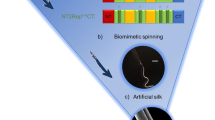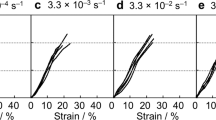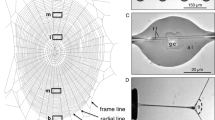Abstract
THE orb web of the garden cross spider Araneus diadetnatus is made up of two types of thread with distinctive mechanical properties: stiff radial threads which sag when contracted by only 10%, and elastic circumferential 'capture' threads which can be contracted to less than 5% of their original length in the web without sagging1-5. Everyday silk is stiff, but can be plasticized by water6-9. It is known that capture threads are coated with a thin layer of aqueous glue10-12, and the question arises as to whether this layer can account for their remarkable elasticity. The evidence presented here suggests that the differences between radial and capture threads are primarily the result of the water coating of the capture threads, which both plasticizes the silk and provides additional elasticity from the surface tension of the liquid.
This is a preview of subscription content, access via your institution
Access options
Subscribe to this journal
Receive 51 print issues and online access
$199.00 per year
only $3.90 per issue
Buy this article
- Purchase on Springer Link
- Instant access to full article PDF
Prices may be subject to local taxes which are calculated during checkout
Similar content being viewed by others
References
Denny, M. W. J. exp. Biol 65, 485–506 (1976).
Witt, P. N., Reed, C. & Peakall, D. B. A Spider's Web (Springer, Heidelberg, 1968).
Gosline, J. M., DuMont, M. E. & Denny, M. W. Endeavour 10, 37–43 (1986).
Craig, C. L. Biol. J. Linn. Soc. Lond. 30, 135–163 (1987).
DeWilde, J. Arch. neerl. Physiol. 28, 118–131 (1943).
Magoshi, J., Misuide, M. & Magoshi, Y. J. polymer Sci. 17, 515–520 (1979).
Work, R. W. Text. Res. J. 47, 650–662 (1977).
Gosline, J. M., Denny, M. W. & DuMont, M. E. Nature 309, 551–552 (1984).
Work, R. W. J. exp. Biol. 118, 379–404 (1985).
Foelix, R. F. Biology of Spiders (Harvard University Press, 1984).
Tillinghast, E. K. & Townley, M. in Ecophysiology of Spiders. (ed. Nentwig, W.) 203–210 (Springer, Heidelberg, 1987).
Eisner, T., Alsop, R. & Ettershank, G. Science 146, 1058–1061 (1964).
Peters, J. M. in Ecophysiology of Spiders (ed. Nentwig, W.) 187–202 (Springer, Heidelberg, 1987).
Fischer, F. G., Brander, J. & Hoppe-Seylers, Z. Physiol. Chem. 320, 92–102 (1960).
Schildknecht, H., Kunzelmann, P. & Kuhn, C. Naturwissenschaften 29, 98–99 (1960).
Anderson, C. M. & Tillinghast, E. K. Physiol. Entomol. 5, 101–106 (1980).
Rayleigh (Lord), Phil. Mag. 34, 145–154 (1892).
Masters, W. M. & Markl, H. Science 213, 363–365 (1981).
Kovoor, J. in Ecophysiology of Spiders. (ed. Nentwig, W.) 160–186 (Springer, Heidelberg, 1987).
Author information
Authors and Affiliations
Rights and permissions
About this article
Cite this article
Vollrath, F., Edmonds, D. Modulation of the mechanical properties of spider silk by coating with water. Nature 340, 305–307 (1989). https://doi.org/10.1038/340305a0
Received:
Accepted:
Issue Date:
DOI: https://doi.org/10.1038/340305a0
This article is cited by
-
Warming causes contrasting spider behavioural responses by changing their prey size spectra
Nature Climate Change (2024)
-
Tyrosine residues mediate supercontraction in biomimetic spider silk
Communications Materials (2021)
-
Silkworm and spider silk electrospinning: a review
Environmental Chemistry Letters (2021)
-
Simultaneous effect of strain rate and humidity on the structure and mechanical behavior of spider silk
Communications Materials (2020)
-
Buffering by buckling as a route for elastic deformation
Nature Reviews Physics (2019)
Comments
By submitting a comment you agree to abide by our Terms and Community Guidelines. If you find something abusive or that does not comply with our terms or guidelines please flag it as inappropriate.



